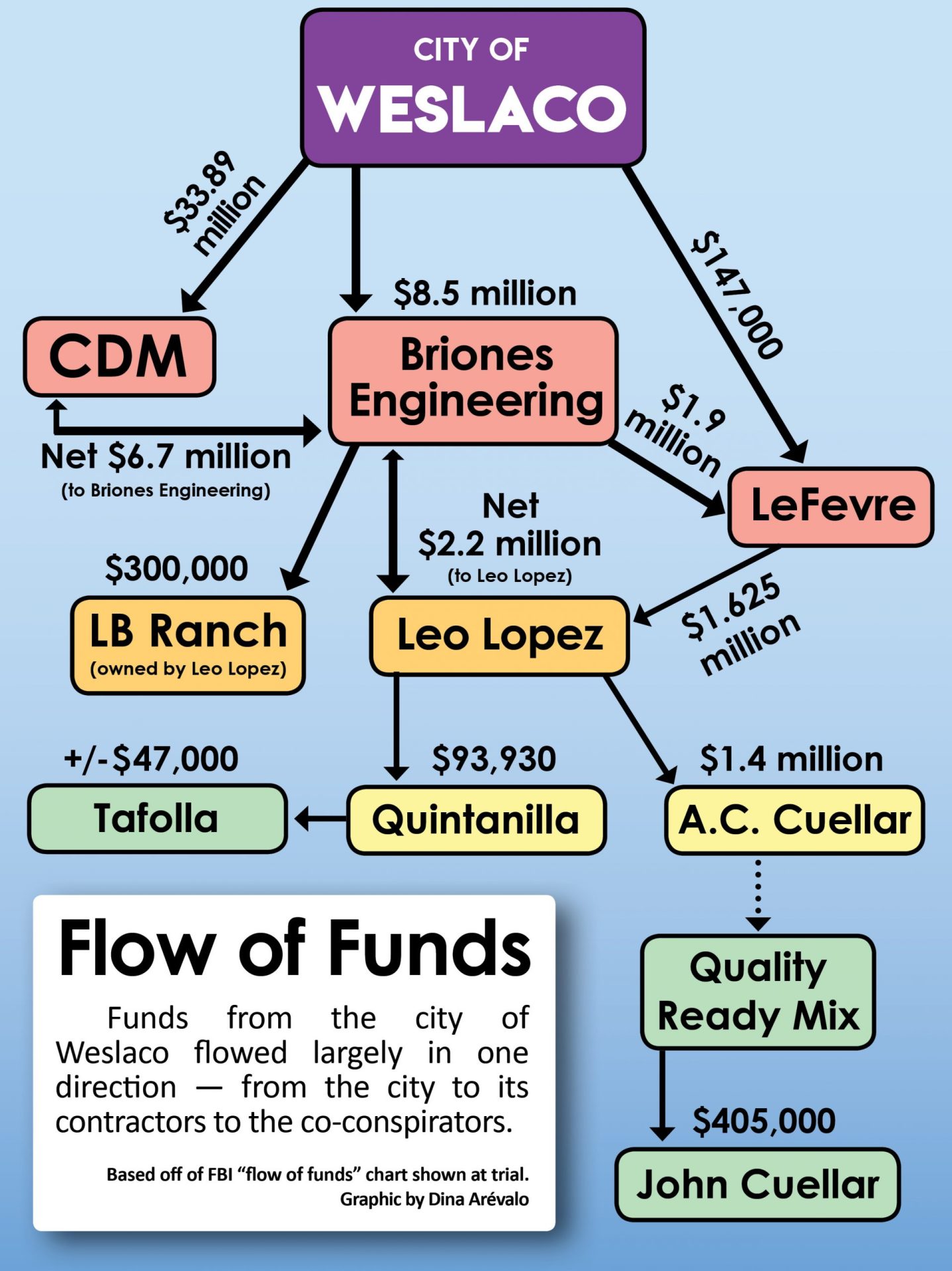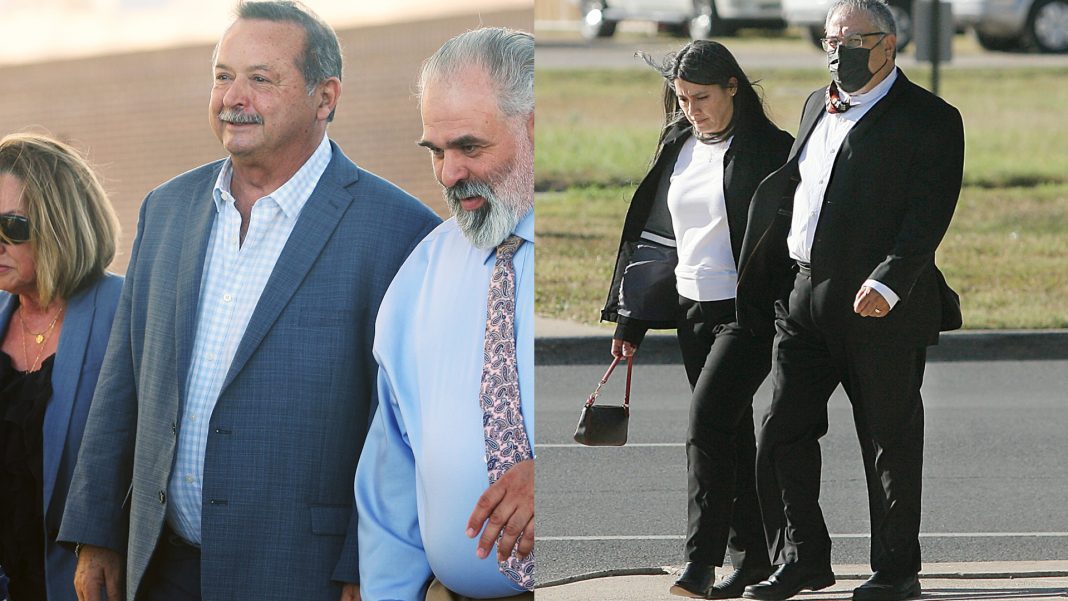McALLEN — It took less than four hours for a federal jury to return a verdict Thursday afternoon finding defendants Arturo “A.C.” Cuellar, the one-time Hidalgo County commissioner, and Weslaco businessman Ricardo “Rick” Quintanilla, guilty on all 70 counts against them.
The lightning-fast verdict came after seven days of testimony, which included a dozen witnesses for the prosecution and two for the defense — witnesses called by attorney Carlos A. Garcia on behalf of his client, Cuellar.
Jaime Peña, the attorney representing Quintanilla, opted to call no witnesses.
And neither defendant chose to take the stand in their own defense.
Family and friends of the two defendants milled about in an empty courtroom Thursday while the jury deliberated in seclusion and while U.S. District Judge Micaela Alvarez presided over her afternoon docket.
Just after 4:15 p.m., word went out that the jury had finished deliberating.
Everyone gathered back in the courtroom and grew silent as Alvarez’s case manager, Mayra R. Guillen, began to read off page after page of jury forms.
“We the jury find the defendant, Arturo C. Cuellar Jr., guilty,” Guillen read.
“We the jury find the defendant, Ricardo Quintanilla, guilty,” she read.
Over and over and over again.
Guillen pronounced the word “guilty” a total of 76 times as she read off the jury’s findings on the 70 counts that had been levied against the two defendants — some of the counts were against them jointly.
The two men sat beside their attorneys in silence while muffled sobs could be heard from the gallery.
Garcia asked the judge to poll the jury — to ask each individual juror if the verdicts they had handed down had been their “true and correct” verdict as to each defendant.
“Yes,” each juror replied in turn.
But how had the jury arrived at that unanimous verdict? And how had the second week of trial played out leading up to that moment?
JASON MALKIEWICZ
The week began with testimony from the government’s last two witnesses — FBI special agent Jason Malkiewicz, who had led the bulk of the yearslong investigation, and Robin Gray, an FBI forensic analyst.
Assistant U.S. Attorney Roberto “Bobby” Lopez Jr. spent just under two-and-half-hours on direct examination of Malkiewicz.
Malkiewicz explained how the FBI had stumbled upon the Weslaco bribery scheme while conducting an unrelated investigation into Leonel J. “Leo” Lopez Jr., the then Rio Grande City Municipal Judge.
The FBI had subpoenaed Leo Lopez’s financials as part of that investigation and discovered suspicious interactions with several construction-related firms.
Those firms included McAllen-based LeFevre Engineering & Consulting, San Antonio-based Briones Consulting, Donna-based Eberle Materials, and Rio Grande City-based JF Trenching & Paving.
That’s also when investigators first discovered checks from Leo Lopez to both of the defendants.
Malkiewicz was new to law enforcement. He arrived to the Rio Grande Valley in the summer of 2016, straight after graduating from the FBI training academy. At the time, the investigation was in its infancy.
Just a few weeks after moving here, Malkiewicz took over as lead agent on the case after his mentor transferred to another FBI field office.
When the defense began its cross examination of the agent on Monday, they honed in on Malkiewicz’s inexperience.
In fact, much of Garcia’s and Peña’s cross examination went toward assailing the agent’s competency and integrity.
Peña said a criminal investigation should be “HOT” — honest, objective and thorough. However, throughout the cross examination, he implied the green agent had been anything but.
The defense attorney criticized Malkiewicz for not listening to audio recordings of Weslaco City Commission meetings in their entirety, of not reading the transcript of a surreptitious audio recording until much after the fact and of failing to get complete bank records — especially any of Quintanilla’s bank records.
When Garcia cross examined the agent, he heavily implied that Malkiewicz and the other agents on the case had allowed preconceptions of guilt to steer their investigation.
“Do you only look for stuff that makes people look guilty?” Garcia asked.
“No,” Malkiewicz replied. “Anything and everything,” he added, noting that agents try to disprove an allegation as much as they do to prove it.
ROBIN GRAY
The last witness prosecutors called was Robin Gray, the FBI forensic analyst.
Gray testified that she had analyzed all the financial information in the case, including a total of 137 accounts belonging to both defendants and entities for at least eight years, from March 2008 through December 2016.
Gray also examined the financial records of the city of Weslaco, Rolando Briones, the principle of Briones Engineering, Richard LeFevre, the principle of LeFevre Engineering, Leo Lopez, the former municipal judge, John F. Cuellar, the former Weslaco Mayor Pro tem, and defendant A.C. Cuellar.
Of those 137 accounts, 57 of them were associated or controlled by A.C. Cuellar, Gray testified.
She had been unable to analyze defendant Quintanilla’s financials because, as Malkiewicz had earlier testified, agents hadn’t been able to identify any bank records associated with him. Despite that, however, Gray had been able to create what she called a “flow of funds” chart from the information she did have.

The chart illustrated the primarily unidirectional flow of money from Weslaco to its contractors — Boston-based engineering firm, CDM Smith, and Briones Engineering — and then from the contractors to Leo Lopez.
The chart showed how Leo Lopez would, in turn, give money to Quintanilla and A.C. Cuellar, who then paid bribes to then-District 4 Weslaco Commissioner Gerardo “Jerry” Tafolla and John Cuellar, respectively.
DEFENSE WITNESSES
The defense began calling its first witnesses Tuesday afternoon.
Garcia first called A.C. Cuellar’s own son, Arturo Cuellar III, to the stand.
But Cuellar III’s testimony was cut short when prosecutor Bobby Lopez lodged an objection that forced a lengthy conference at the judge’s bench.
After some long minutes — and in a rare and unusual move — Cuellar III was called to join the conference.
When he returned to the witness stand, the judge said she needed to admonish him, implying that he had been skirting dangerously close to admitting to tax fraud.
Just prior to the interruption, Bobby Lopez had been questioning Cuellar III over tax write-offs that a Corpus Christi concrete company called Quality Ready Mix had been making in the mid-2010s.
Cuellar III had testified that QRM — which at the time had been 50% owned by his father, A.C. — had been paying John Cuellar $10,000 per month for legal services.
But Cuellar III also testified that those legal services had come much earlier, when John Cuellar had provided his cousin, A.C., free legal advice for years, according to the defense.
Prosecutors argued that the payments from QRM to John — some $405,000 between 2011 and 2014 — were actually bribes from A.C.
AGENT RONCSKA
Wednesday’s trial proceedings got underway not with the continuation of Cuellar III’s testimony, but with a battle over the defense’s next witness, FBI special agent David Roncska.
Garcia wanted to call Roncska to testify over a statement the agent had allegedly made during a February 2018 interview with John Cuellar at his Weslaco home.
That interview was the Bureau’s first official contact with the then-Weslaco commissioner.
Garcia painted Roncska as a bully who threw his weight around not only to intimidate targets of the investigation, but his own colleagues, as well.
After more than an hour of getting nowhere with John Cuellar during the interview, John Cuellar stepped away briefly.
It was during that absence that Agent Malkiewicz asked his colleagues what to do next. Roncska allegedly told the newer agent, “Pound his a – – .”
Garcia wanted Roncska to answer questions about his alleged statement in front of the jury, but the judge denied his motion to do so.
Garcia vociferously disagreed with the judge and engaged in a shouting match with her.
The defense attorney said the judge’s decision violated his client’s Sixth Amendment rights and asked for a continuance to more fully address the issue.
Alvarez denied it.
Garcia — joined by Peña — then called for a mistrial.
The judge denied that, as well.
The judge ultimately allowed Garcia to question Roncska about the “pound his a – – “ comment after the jury had been sent home for the day on Wednesday.
Garcia did so to preserve the court record should the case be appealed.
CLOSING ARGUMENTS
The government gets the first and the last opportunity to address the jury at the conclusion of any trial.
When closing arguments began Thursday morning, prosecutor Bobby Lopez was the first to paint a picture for them.
He began by revisiting an idea he had hammered during John Cuellar’s testimony last week — that though John loved his cousin A.C., his cousin had only seen John as a means to a profitable end.
“What the defendant told him years ago is true — (John’s) no longer a public official. He is a nobody,” Bobby Lopez said, referring to John Cuellar’s November 2014 reelection loss.
Repeatedly, the prosecutor came back to that relationship of convenience.
“After losing that election, his cousin laughed. His cousin stopped paying him,” Bobby Lopez said.
The defense, meanwhile, reiterated the themes it peppered through their questions during the trial — theories that both the federal investigators and the prosecutors tied to the case were a corrupt lot bent on exercising their excessive might over the little guy.
Peña accused the government of having “an agenda” — of “cherry picking” evidence and forcing cooperating witnesses to puppet testimony.
“They will fight tooth and nail to restrict the evidence,” Peña said about prosecutors.
He claimed the FBI had browbeaten people into complying with the investigation — by threatening to charge Leo Lopez’s wife because the couple had filed joint tax returns and by threatening stiff prison terms for Tafolla and John Cuellar for not testifying to their satisfaction.
Garcia called the case against the defendants lies.
“The evidence in this case is wholly false,” Garcia said.
But the jury didn’t buy it. They returned their verdict in just under four hours — part of which they spent eating a boxed lunch from Jason’s Deli.
“Follow the money. The money talks,” Bobby Lopez told them at the conclusion of his closing arguments.
“The city of Weslaco made a decision based on necessity (about the water plant project). The defendants made a decision based on opportunity — drowning in bribes while the city couldn’t get water,” he said.





